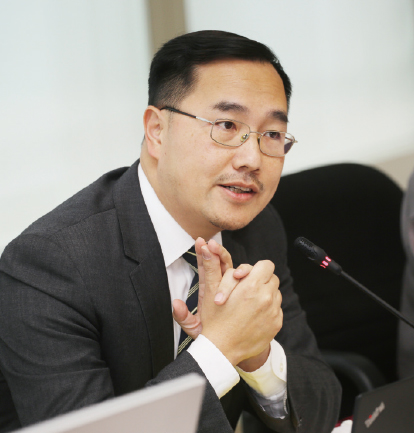Last year, the Hong Kong Monetary Authority (HKMA) joined forces with the banking sector to launch “eTradeConnect”, Hong Kong’s first large-scale blockchain-based trade finance platform. It also planned to sign a memorandum of understanding with “we.trade”, Europe’s largest digital trade finance platform. It is foreseeable that blockchain technology will bring about major transformation in the financial sector.

Colin Pou: HKMA’s eTradeConnect for Service Innovation and Diversification
Last year, the Hong Kong Monetary Authority (HKMA) joined forces with the banking sector to launch “eTradeConnect”, Hong Kong’s first large-scale blockchain-based trade finance platform. According to the HKMA, it is currently looking at connecting “eTradeConnect” with related platforms to give more SMEs and micro-enterprises access to financing opportunities, while continuing to promote the adoption of new technologies such as blockchain.
Fully funded by a consortium of 12 major banks in Hong Kong under the facilitation of the HKMA, “eTradeConnect” further boosts fintech development in Hong Kong. Colin Pou, Executive Director (Financial Infrastructure Department) of the HKMA, said that the first version of the platform, which was officially launched last October, commenced as a minimum viable product (MVP).
Connection with e-trade platforms for smoother loan approval
 “Since the launch of ‘eTradeConnect’, the participating banks have been working on improving the platform based on collected user feedback, such as improving the connection of different trade participants and making the platform more scalable through open APIs.” Pou added that the HKMA is now exploring ways to link “eTradeConnect” with e-trade service providers and other related platforms to enable banks to better use trade data such as purchase order and customs clearance information so that the loan approval process is smoother and less time-consuming, thus further increasing the financing opportunities for SMEs and micro-enterprises.
“Since the launch of ‘eTradeConnect’, the participating banks have been working on improving the platform based on collected user feedback, such as improving the connection of different trade participants and making the platform more scalable through open APIs.” Pou added that the HKMA is now exploring ways to link “eTradeConnect” with e-trade service providers and other related platforms to enable banks to better use trade data such as purchase order and customs clearance information so that the loan approval process is smoother and less time-consuming, thus further increasing the financing opportunities for SMEs and micro-enterprises.
He encouraged enterprises interested in relevant financing methods to reach out to the member banks of “eTradeConnect” for more practical information. With the completion of the various improvements, “eTradeConnect” will start a new round of getting customers online.
Promoting cross-boundary trade and Asia-Europe digital interconnectivity
Earlier, “eTradeConnect” signed a memorandum of understanding with “we.trade”, Europe’s largest digital trade finance platform, which paved the way for the digitalization of cross- boundary trades in the Asia and Europe trade corridor, according to Pou. “The connection between two large-scale blockchain trade finance platforms is the first in the world, and will serve as a good reference for future interconnectivity of different blockchain platforms.”
Pou noted that the practical application of blockchain technology is still in its infancy worldwide, with most regions remaining focused on technical research. “The HKMA conducted a study on Distributed Ledger Technology (DLT) in 2016 and published the results in two white papers. The white papers mainly explored the potential application of DLT in financial services and identified the challenges that may arise in the areas of governance, risk management, regulatory compliance, law and deployment. In addition, while acknowledging DLT’s potential, especially for international payment and remittance, clearance and settlement, the white papers pointed out that DLT is not fully applicable to all financial services.”
Wide blockchain applications in finance and commerce
Pou added that the research results published in the white papers will help deepen businesses’ understanding of blockchain technology. Hong Kong’s financial institutions are also gradually applying blockchain technology in the commercial sphere. “At present, some local banks are using blockchain technology to improve the mortgage process to ensure that valuation data will not be tampered with during transmission and to reduce human errors. In addition, some local banks and financial institutions are applying blockchain technology to provide services such as remittance and auto insurance certification.”
Blockchain technology can be applied to different financial services because of its tamper-proof Note 1, high-transparency Note 2 and decentralisation characteristics. It can also contribute widely to the security and efficiency of financial services. Nevertheless, there are challenges in using blockchain technology, such as the need to address compatibility issues associated with connecting different blockchain technology platforms.” Pou stressed that as a regulator, the HKMA always encourages businesses to use new technologies such as blockchain to provide more innovative financial services.
Note 1: The authenticity of each new transaction on the blockchain must be verified by the blockchain network. Once verified, the relevant record can neither be altered nor deleted.
Note 2: Since all transactions are open and traceable, and permanently stored in blocks, blockchain has very high transparency and can provide assurance about the authenticity of the records.

George Tee: Blockchain Promotes HK’s Innovative Fintech
The adoption of blockchain applications in Hong Kong’s financial sector is gathering pace. Following the “eTradeConnect” unveiled by the HKMA and the banking sector last October, Charles Li, Chief Executive of Hong Kong Exchanges and Clearing Limited (HKEX), said that HKEX is exploring the use of blockchain technology for processing of northbound trades under the “Stock Connect” scheme with the Mainland. In the view of George Tee, Chief Technology Officer of Hong Kong Science and Technology Parks Corporation (HKSTP), these two developments show that blockchain applications have taken a big step forward in Hong Kong’s financial sector.
Open up API for data sharing
 “Blockchain applications have great potential in Hong Kong’s banking and financial sectors as its policy on blockchain is flexible.” Tee said that in Hong Kong, blockchain applications were mainly used in cryptocurrencies a few years ago, but in recent years, they have been widely used in inter-bank settlement systems, cross-border payments, supply chain finance, real estate mortgages, and insurance, etc. Early this year, the banking sector launched the first phase of the opening up of application programmable interface (API) functions, which allow third-party access to information about the banks’ products and services to offer more convenient and innovative financial services to the public.
“Blockchain applications have great potential in Hong Kong’s banking and financial sectors as its policy on blockchain is flexible.” Tee said that in Hong Kong, blockchain applications were mainly used in cryptocurrencies a few years ago, but in recent years, they have been widely used in inter-bank settlement systems, cross-border payments, supply chain finance, real estate mortgages, and insurance, etc. Early this year, the banking sector launched the first phase of the opening up of application programmable interface (API) functions, which allow third-party access to information about the banks’ products and services to offer more convenient and innovative financial services to the public.
Over 16 banks are currently participating in the first phase of API opening up. This is an important milestone for data sharing in Hong Kong. Tee stressed that data sharing and blockchain can complement each other. “Data sharing and blockchain integration enables data owners to manage access to data and better protect data. In addition, based on blockchain’s traceability features, data owners can trace back by who, when and how their data are viewed or used at any time, which allow for more efficient management of valuable data and a more detailed charging model for data usage.”
Encourage businesses to develop and innovate
Tee believes that suitable application scenarios and talent training are very important for promoting innovation and wide adoption of blockchain applications in the financial sector. “We need to make businesses aware of the transformation and benefits brought about by blockchain and encourage business leaders to embrace new technologies.” He added that Hong Kong needs to nurture more blockchain technology talents and accelerate the development of technologies that meet the needs of the real economy, such as the financial and banking sectors, thus lowering the threshold for applying related technologies.
Tee welcomes any regulatory policies that are appropriate and in line with the development of blockchain to provide direction and guidance for the further development of relevant technologies. “At present, the HKMA and the SFC have respectively set up ‘sandboxes’ to allow businesses to test their fintech-enabled products and services in a restricted regulatory environment before launching them in the market, which will help the development of relevant industries.”
Tee stressed that the government can apply and promote blockchain across a variety of applicable government platforms to boost the public’s trust in innovative solutions while guiding the development of blockchain in the real economy, and providing funding support for blockchain start-ups.
Apply extensively to real economy
According to Tee, HKSTP actively links up different partners, e.g. collaborating with Hong Kong Applied Science and Technology Research Institute (ASTRI) and Molecular Hub (Mhub) to launch the first blockchain start-up accelerator scheme in Hong Kong. “Early this year, we signed a memorandum of cooperation with Tencent, where Tencent will share its resources and technical expertise in areas such as payment systems, electronic wallets, data security, Internet of Things, blockchain, artificial intelligence and cloud computing to support the enterprises in the park and develop various innovative fintech solutions.”
Tee said that the more successful blockchain applications are mainly those in the financial sector, but it is worth considering how to apply blockchain more widely in the real economy to bring benefits and bring about positive changes to the traditional economic models.

Thomas Cheung: Blockchain Builds Trust in Business Community
Deploy early to deal with the situation
When talking about blockchain, most people would think of virtual currencies such as Bitcoin, but this is only a glimpse of blockchain applications. The more important function of blockchain is to “build trust”. Thomas Cheung, the Chamber’s Standing Committee Member and Chairman of the Hong Kong Blockchain Society, said that blockchain technology can be used to establish records and certifications for various electronic documents and related assets, change the way economy operates and deal with the trust issues in the business community, which are an important step for Hong Kong’s future financial development.
Cheung pointed out that Facebook has recently published a white paper on Libra, its virtual currency. The entry of this massive social media, which boasts 2.7 billion accounts, is set to accelerate the adoption of blockchain applications in finance. Therefore, he believes that Hong Kong and the Mainland should not lag behind the times and must enact relevant laws and regulations early for the development of blockchain-based financial applications.
Promote without hesitation since Hong Kong has an edge
 He explained that Hong Kong has a strong competitive edge in the area of digital economy. First, at the institutional level, the political system of “One Country, Two Systems” not only provides a seamless link between Hong Kong’s legal system and developed countries, but also makes its economic environment a model in the global financial and trading system. At the human geography level, Hong Kong’s international environment makes it a workplace well sought after by talents from all over the world, and a very large proportion of its professionals are proficient in both Chinese and English, the world’s two main business languages. As a financial centre, Hong Kong serves as a super hub connecting the banks and capital markets in the Mainland, Asia Pacific and international markets, bringing together the largest number of international capital and financial services institutions in the region. He believes that Hong Kong should actively develop and adopt financial technology (fintech) to avoid falling behind others such as Singapore and ensure that it become an international financial centre for the digital economy.
He explained that Hong Kong has a strong competitive edge in the area of digital economy. First, at the institutional level, the political system of “One Country, Two Systems” not only provides a seamless link between Hong Kong’s legal system and developed countries, but also makes its economic environment a model in the global financial and trading system. At the human geography level, Hong Kong’s international environment makes it a workplace well sought after by talents from all over the world, and a very large proportion of its professionals are proficient in both Chinese and English, the world’s two main business languages. As a financial centre, Hong Kong serves as a super hub connecting the banks and capital markets in the Mainland, Asia Pacific and international markets, bringing together the largest number of international capital and financial services institutions in the region. He believes that Hong Kong should actively develop and adopt financial technology (fintech) to avoid falling behind others such as Singapore and ensure that it become an international financial centre for the digital economy.
However, Cheung also said that a sound system is a double-edged sword. Although it provides a firm foundation for Hong Kong, it inevitably creates comfort and inertia in financial development. As a result, the Government and local businesses may not dare to implement drastic reforms and speed up the adoption of blockchain applications. Hence, he suggested that government units should interact positively with local businesses to gain a deeper understanding of new industry developments and launch relevant policies more effectively. In addition, the Government can consider setting up an eco-investment fund to focus on investing in leading technology industries, such as the securities communications industry, in order to obtain the right to formulate technical standards for relevant fintech as soon as possible. This will not only provide an efficient tool for the traditional capital markets and financial sector, but also lay a foundation for capital market innovation in the digital economy.
Nurture talents for sustainable development
Cheung added that backed by the motherland and given the national strategies of the “Belt and Road Initiative” and the Guangdong-Hong Kong-Macao Greater Bay Area (Greater Bay Area), Hong Kong could formulate global blockchain standards. In his view, the Greater Bay Area provides Hong Kong with a broader market, which helps to consolidate Hong Kong’s position and makes it possible to achieve greater innovation in blockchain at the legal level. Moreover, in terms of standards and protocols for technology such as blockchain, it could develop globally unified protocols to lead blockchain innovation.
Cheung also has opinions on talent development. He said that to drive the development of blockchain in the local financial sector, apart from bringing in foreign expertise, it is also necessary to think about how to nurture new local talents. Cheung, who holds various prominent positions at several local blockchain societies, revealed that the objective of the societies is to discover and train a group of people who are passionate about blockchain technology, cryptography and cryptocurrencies from university students to technical professionals in the hope that blockchain technology will become more widely adopted in Hong Kong. He also hopes that the Government can step up its outreach and education efforts to increase the general public's awareness of blockchain applications so that they can become more widespread in the future.
How can Blockchain Build Trust in the Financial Sector?
In the financial sector, from the past, a centralized platform is needed to bring the transacting parties together during the transaction process. The stability of the transaction process is managed and controlled by the platform. However, the premise is that this platform must be fair and honest.
Blockchain has the most innovative idea in recent years: decentralization. All because it has a decentralized data computing and storage platform and allows point-to-point connections. Its emergence makes it impossible to carry out illegal activities like on a centralized platform because the transacting parties no longer need to transact through any centralized platform, which not only overcomes trust issues, but also reduces the hurdles required in the transaction process, thus making it more efficient.
Blockchain technology has very extensive applications, and fintech is the most important application area. In addition to improving the overall efficiency of financial services, its operating principle of “sequentially linking blocks of information from the back to the front” can also ensure system security, unlike centralized platforms which could be hacked. Therefore, it can be used in the banking system to overcome errors and hacking attacks.




